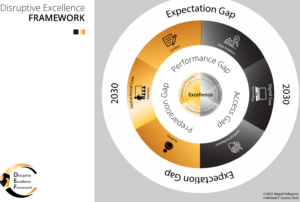Maria Voles Ferguson: VP-Policy, Alliance for Excellent Education
Maria Voles Ferguson, VP for Policy at the Alliance for Excellent Education, stopped by EdReformer’s Blog on the Spot at the Excellence in Action National Summit. Below is one issue on the top of her mind.
You have remarked that boys face unique challenges in school. What are they?
I am sure my perspective on the challenges boys face in the public system is not a universal truth, but anyone who has both a male and female child knows that they develop differently and respond differently to instruction and expectations. In our high performing school district, the expectations for organization, attention, and self-direction seem wildly unrealistic, especially for young boys who tend to be very physical, very fidgety, and not terribly focused on organizing themselves. There is plenty of brain research that shows the timeline for when these abilities — what is referred to in schools as “executive function” — develop in kids is not in sync with the expectations of most high-performing schools. Also, the drill-and-kill worksheets we see so much of these days and the limited physical activity kids get before, during, and after school really impacts the boys. Something is wrong when you have five boys in a class of 30 kids on medication for ADD or ADHD.
What are some of the solutions that you see for this challenge?
There are some public schools that make changes within their schools to help accommodate the needs of boys. Our school reinstated PE for a full five days a week and added additional recess time. They also offer special sessions where students (mostly boys!) struggling with the organizational requirements of their work can get additional help and support.
What else do you see being done to meet this challenge?
The drive to meet rigorous and narrow accountability measures (and the classroom environment that creates…static, solitary, boring!) is a much bigger problem. The state-led common standards movement (now 43 states strong) represents a major step in the right direction. The next generation assessments currently being developed for states to measure progress based on these standards should also help. These assessments will allow teachers to assess and measure student progress in a much more expanded and nuanced way. These changes might help create classrooms that allow all kids (even squirmy disorganized boys) to learn, grow, and succeed in ways that research (and common sense) tells us are appropriate for their age and gender.
Related articles
- Report: Lower Dropout Rates Are No Cause for Celebration (time.com)
- The Differences Between Gifted and Non-Gifted Children with ADHD (brighthub.com)
- Students Struggling With Reading, Math (abcnews.go.com)
- Boldly Innovate or be Badly Irrelevant (edreformer.com)






0 Comments
Leave a Comment
Your email address will not be published. All fields are required.